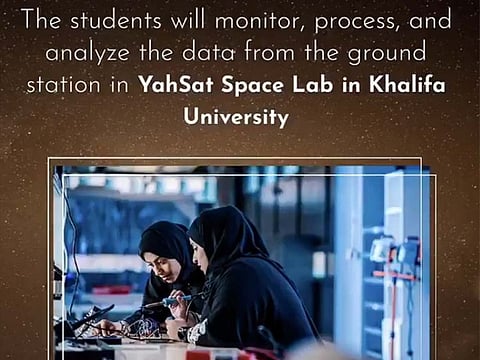MeznSat, UAE’s first student-built satellite, set for launch this month
Initiative aims at studying the Arabian Gulf waters, greenhouse gases and red tide

Dubai: The UAE will send yet another satellite to space this month, less than two months after the successful launch of its Mars-bound Hope Probe, from the Tanegashima Space Centre in Japan.
MeznSat, the result of a collaboration between the UAE Space Agency, American University of Ras Al Khaimah (AURAK) and Khalifa University of Science and Technology (KUST), will be launched later this month aboard a Russian Soyuz rocket. The UAE’s first student-built satellite will study the coastal waters of the Arabian Gulf. It will also enrich scientific research and boost space-related activities while studying greenhouse gas and red tide phenomenon in the UAE, the Dubai Media Office (DMO) tweeted on Wednesday.
Students from AURAK and KUST who designed and built the satellite will monitor, process and analyse data from the ground station in YasSat Space Lab at Khalifa University
“They (students) will collect and analyse greenhouse gas emissions, specifically Carbon dioxide, methane concentrations and red tide phenomenon over the UAE using the shortwave infrared (SWIR) region (1650-1000nm),” according to DMO.
Student project
The development of MeznSat, a CubeSat or miniaturised satellite for space research began in 2017 as an education programme to design, build and operate a satellite. It was designed to study the UAE environment and also look at greenhouse gas emissions over the UAE, especially methane and carbon dioxide.
Abdul-Halim Jallad, director and assistant professor, Center of Information, Communication and Networking Education and Innovation (ICONET), had first announced the launch of MeznSat in June this year. He said the nanosatellite is designed to detect greenhouse gas concentrations from an orbit of 565km above the Earth.
“Once in orbit, the team of students will then monitor, process and analyse the data from a ground station in the UAE. The processes and expertise involved in monitoring the atmosphere are similar to those employed during conventional Earth Observation programmes. The project looks to support Emirati young people in developing the skillsets necessary for the UAE’s ambitious National Space Programme and its future projects,” Jallad was quoted in earlier reports.
MeznSat is part of a broader UAE nanosatellite programme, with a series of nanosatellites expected to be built by students from various universities.









